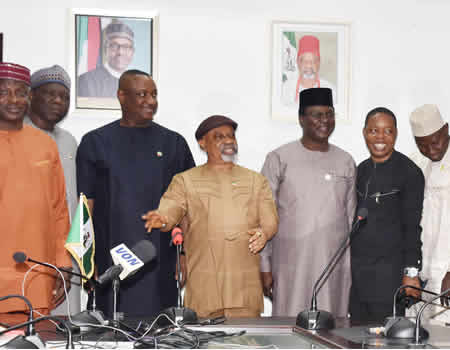The Minister of Labour and Employment, Senator Chris Ngige, on Thursday, promised to meet with President Muhammadu Buhari over the stalemated negotiation on the new N30,000 minimum wage consequential adjustment.
He also assured the leadership of Nigeria Labour Congress (NLC) and the Nigerian workers that the issue of the new minimum wage and its consequential adjustments, particularly to those on Grade Levels 7 to 17, will be sorted out as soon as possible.
Besides, he pointed out that in reality, the Federal Government has already commenced the implementation of the new minimum wage, because strictly, it (minimum wage) is meant for those between level 1 and 6, which the government had started paying.
“Because if we talk strictly about the minimum wage, it is already being implemented, because the minimum wage is for the person on the lower rung of the ladder,” the minister emphatically told the leadership of the NLC during a courtesy visit by the congress to the Minister.
But the NLC President, Comrade Ayuba Wabba tactically warned the minister in its comments that the Labour movement uses consultations first “before confrontation.”
The Minister, who was elated by the visit of the NLC leadership, which many stakeholders seen as a fence-mending meeting between him and the congress, however stated that, he would meet President Buhari on the issue, and added that henceforth, the NLC and the Trade Union Congress (TUC) would be included in the ongoing negotiations on the consequential adjustments.
He said it was unfortunate that negotiations was deadlocked from levels 7 to 17, adding, “the NLC and the TUC have not been involved, but when we come back, we will involve you so that we can have a speedy movement in this respect.”
Ngige acknowledged that the issue of the minimum wage is a difficult one, saying, “the issue of National minimum wage decision was very thorny, in the course of that, tempers flared and there were misgivings and all of that, but finally, we got to a standpoint that gave us 66.7 per cent rise, from 18, 000 to 30, 000.
“I was the chief negotiator from the Government’s side, I wasn’t supposed to, because of the double cap I was wearing, and the president of the nation was very magnanimous and he supported me and supported the minimum wage committee. He provided it with every tool that will enable us to meet as when due and signed the bill from the National Assembly into law April 18, 2019
“We all went to the National Assembly, the unions, and employers association all went and agreed to this N30,000. We also told you that implementation will be smooth and immediately moved a memo to council and council approved it, and we put in a negotiating committee, government side, requested the head of service to contact the Joint Public Service Negotiating Council for us to start, and a committee was inaugurated in the office of the SGF, late April.
“But the committee started work, yes, I was a member, the finance minister was a member, budget and planning was a member, but our council died on 29th May, with the expiration of time, we were dissolved. The budget and planning minister didn’t come back, the permanent secretary took my place and started the negotiations.
“I do not want to say that they didn’t make progress, they made progress because at least, from levels 1 to 6, they got something, and from the time we were coming back, we saw that they were making progress, unfortunately, the head of service, the chair of that committee had to go on compulsory leave and it is not easy when some other person is going to act and move in.
“Before I got into this meeting, I tried to look for the Secretary to the Government of the Federation, because the logical thing for us to do since we have all agreed is to reconstitute our own representation, they have to hand over to us, wherever they stopped.
“Luckily, the President has also put in place a new committee, called Presidential Committee on Salaries (PCS), The former head of service reported to us on progress.
“It is important that we advise them that if they keep on piling debts, the federal government might go into problem of payments, the state governments that have always not been regular with payments will have problem. The best thing to do is for them to send down this to the state and show the example by paying.
“The state government as at today are duty-bound, and they now have the template to pay level 1-6, and they are plenty, when we reconstitute our committee, I do not see us not agreeing. We can disagree, but we will eventually agree, but we will come back, we know ourselves.
“I am one of those who believe that a workman is due his wages, if you work, in a vineyard, you will eat from that vineyard, and you will eat all of the fruits that are in the vineyard.”
Ngige added: “The consequential adjustment that is following it must also be reflected, they must be done because you have impinged on other people’s scale. For example, you pay N30,000 to the person on level 1.1, when that 30,000 was what some other was getting when he was on level 7, it doesn’t fly. So, there must be a consequential adjustment and the government is not averse to the consequential adjustment.
“What we are saying is that we should try for all parties to agree, that the economy is in doldrums, that the economy has some troubles, and therefore, we have to cut our coat according to our cloth, that is the most important thing.”
